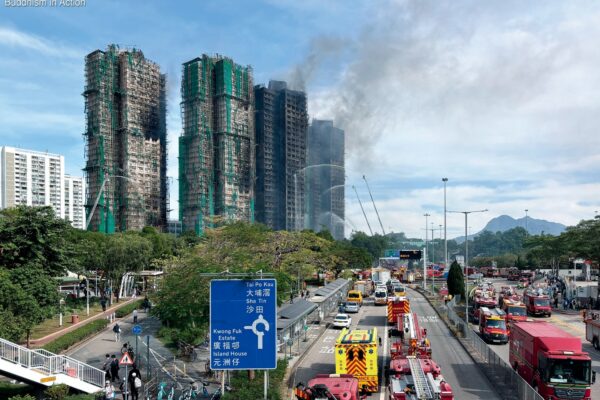By Li Lixin, Li Yanhong, Liu Yiying, and Tang Xiaohui
Translated by Wu Hsiao-ting
In January 2021, seven million people in Shenyang, China, were required to receive coronavirus tests. It was a colossal undertaking. Doing what they could to support the effort, Tzu Chi volunteers helped with testing residents and donated protective gear to frontline workers to safeguard their health.
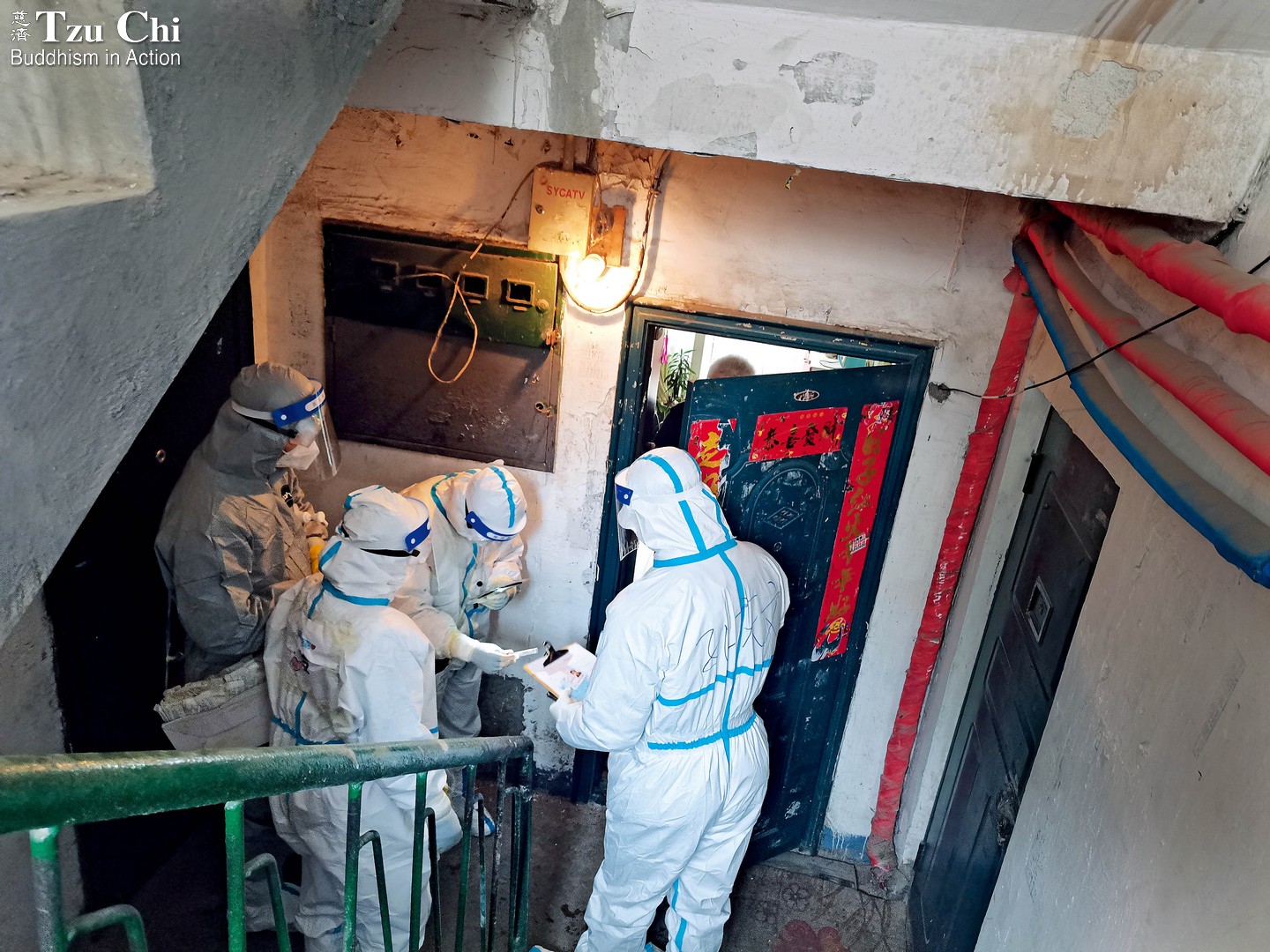
Medical professionals and community workers visit household after household in Huanggu District, Shenyang, China, to collect samples for COVID-19 testing. Tang Xiaohui
On December 23, 2020, ten days after she was released from quarantine, a woman returning from abroad to the city of Shenyang, Liaoning Province, northeast China, tested positive for COVID-19. Within a week, more than a dozen new infections were diagnosed. On December 30, the city entered “wartime” mode. The next day, an effort was launched to conduct COVID-19 nucleic acid tests for every person in the city.
On January 2, 2021, the government of the Huanggu District in Shenyang decided to lock down the Minglian Subdistrict to stem the spread of the virus. The borders of the subdistrict were closed that very same day. People could enter, but not leave, the area. Only two businesses that provided daily necessities remained open in the controlled area; all other stores were shut down. Residents began panic buying, not knowing what to expect next.
Since the entire population in Shenyang was required to undergo COVID-19 testing, temporary tents were set up in Minglian where medical professionals and community workers could work. The tents were not heated, and though the flimsy walls could block the wind, there was no way to prevent the freezing winter coldness from creeping in. Sometimes it was even colder inside than outside because the tents also kept out the sun.
Community workers maintained order outside the tents. Residents wearing masks and gloves stood one meter (3.3 feet) apart in line in the open air, waiting to be tested. Later, to prevent crowds from forming, workers began making home visits to collect test samples instead of requiring people to come to the tents. Medical professionals and support workers visited one building after another and climbed floor after floor to reach each resident for testing. It’s easy to imagine how hot they were in their protective isolation suits during their seemingly endless rounds.
Early in the morning on the 14th day of the lockdown, Tang Xiaohui (唐曉輝), a resident of Minglian, looked out her window to see snow drifting down and the ground covered in white. At that very moment, she heard someone knock on her door and announce: “Please get your ID card ready. We’re here to do nucleic acid testing.” Tang opened her door to see a group of people decked out head-to-toe in white protective clothing.
A sense of respect rose in her heart as she saw how the healthcare and community workers were braving the snow and frigid cold to collect the samples. “Without their hard work, it would be impossible for us to stay safe in our warm homes,” Tang thought to herself.
Tang is a Tzu Chi volunteer. Just two days earlier, moved by the service of frontline workers, she had overcome her fear and visited Lianshui, a community where confirmed infections had been reported. She talked to the party secretary there about the desire of Tzu Chi volunteers to help combat the coronavirus. “You’re all wonderful people, doing charity work,” said the official. “It’d be great if Tzu Chi could provide face masks for us.” Tang told the secretary she’d deliver the promised medical masks to him as soon as they arrived from the city of Suzhou, east China, where Tzu Chi China headquarters is located.
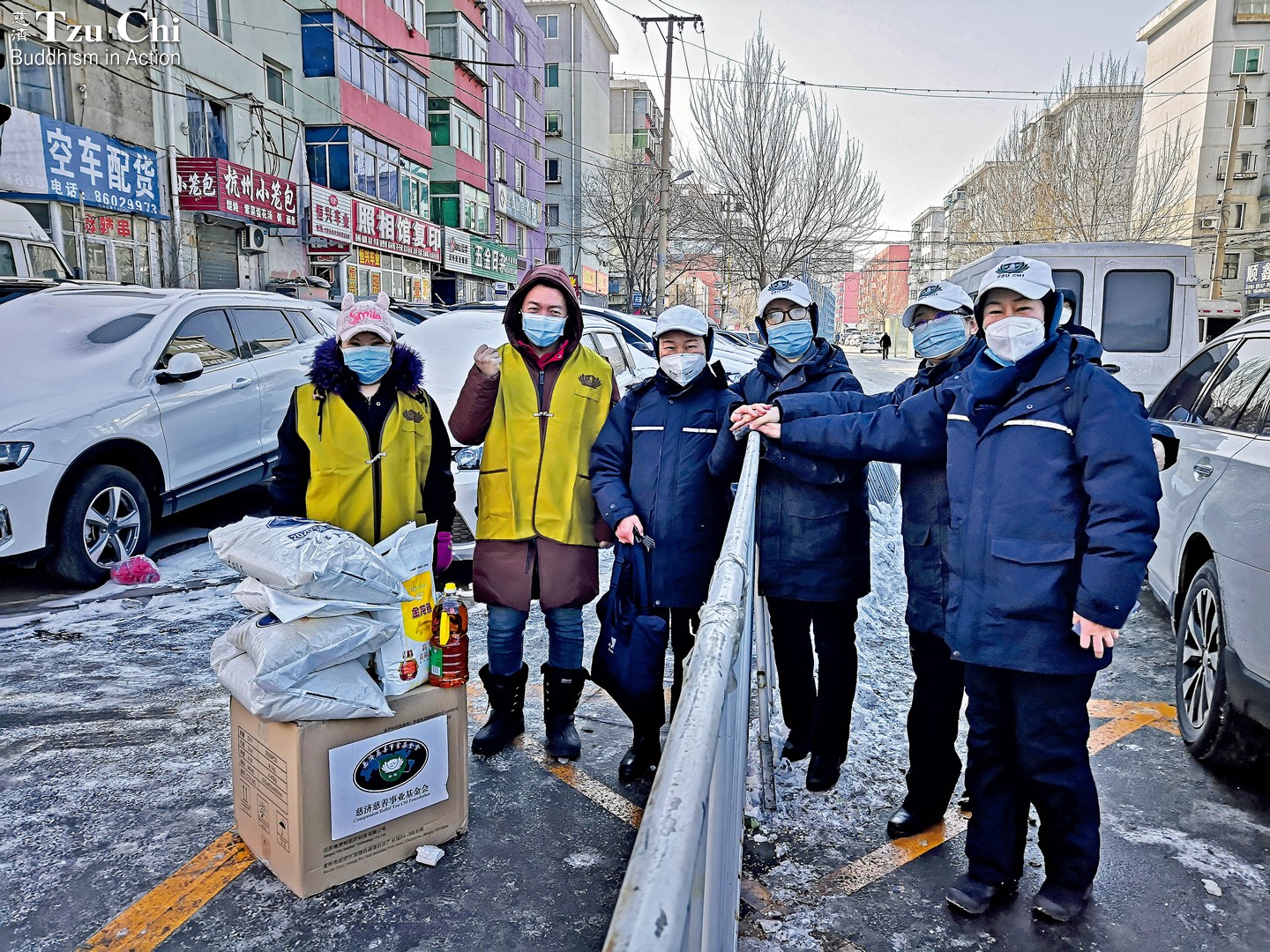
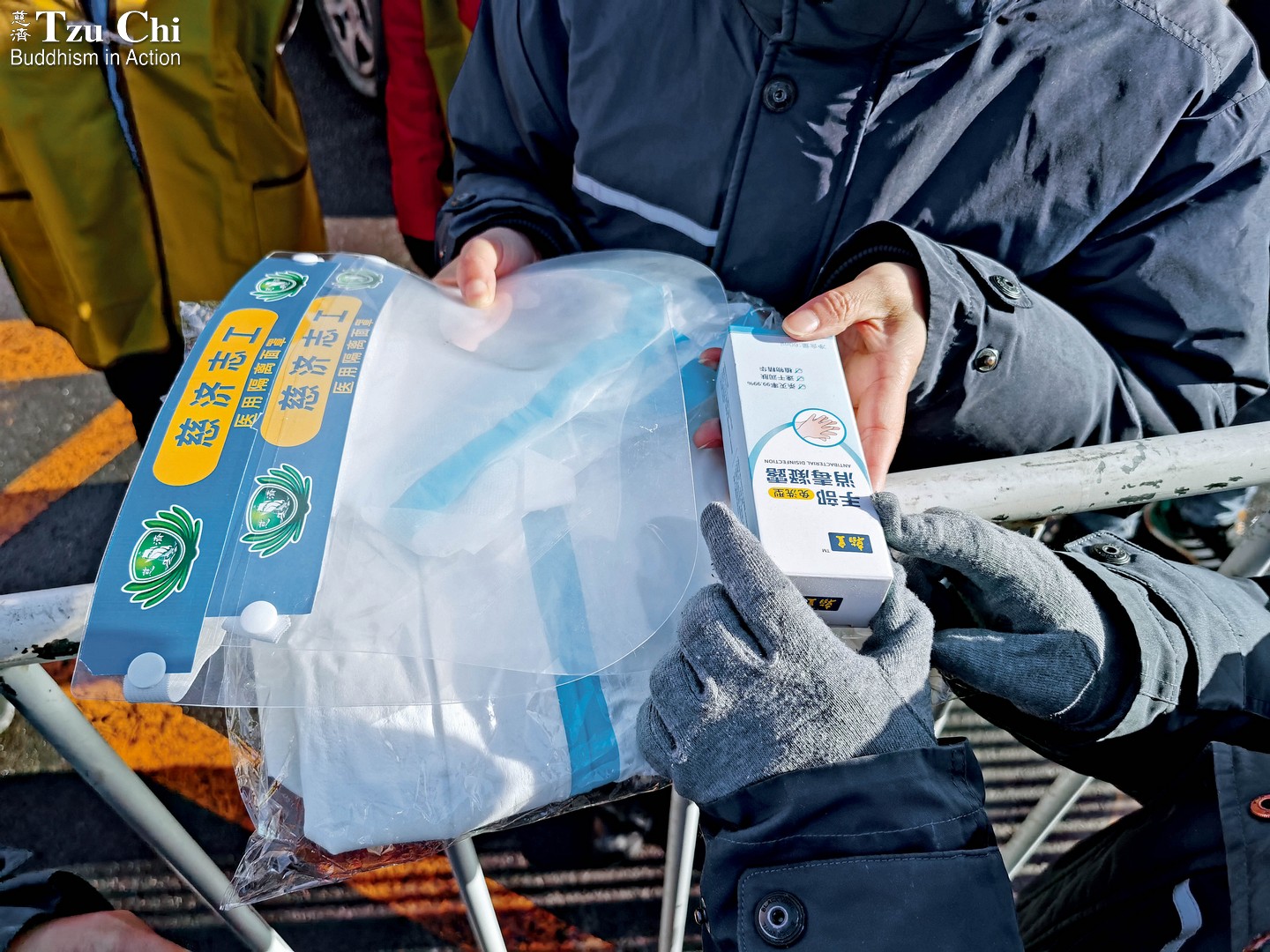
Volunteers delivered supplies to Tang Xiaohui for distribution to medical workers and Tzu Chi care recipients. Tang, in blue to the left of the barrier, was assisted by two of her neighbors, in yellow. They live in an area that was in lockdown and could not obtain the supplies without the help of the volunteers on the right. Liu Yiying
Let me help
Tang is the only Tzu Chi volunteer in her community, so she asked a couple of neighbors in her building to help her pick up the masks and other supplies when they arrived. She was scheduled to pick them up at noon on January 16. When Tang and her two neighbors arrived that day to collect the supplies, she was overjoyed to see the four Tzu Chi volunteers that had brought the goods to her: Sun Huiying (孫慧穎), Liu yiying (劉乙穎), Li Yanhong (李艷紅), and Liu Ge (劉革). She was overcome with emotion seeing her fellow volunteers during such a difficult time.
A large box of medical masks and some rice, noodles, cooking oil, and other necessities intended for Tzu Chi care recipients in Minglian were passed over a metal barrier to Tang and her helpers. Tang and her neighbors loaded the goods into a car, then headed to their first stop, the Lianshui community, to deliver the masks. When the party secretary in Lianshui saw her and the masks, he exclaimed warmly: “Many thanks to Tzu Chi! Your help is so timely, it’s like sending charcoal during a snowfall.” The trio then proceeded to their next stop: care recipient Chen’s home.
Chen had to undergo two dialysis sessions each week. After Minglian was put on lockdown, arrangements were made to move her to a hotel outside the controlled area so that her treatments could continue uninterrupted. So, Chen’s brother, Dazhong (大忠), came downstairs to receive the goods from Tang on behalf of his sister.
Dazhong often attended Tzu Chi events before the pandemic, so he already knew Tang. He was as happy and excited as a child when he saw her that day. Under other circumstances, the two might have taken some time to chat and catch up, but such a visit would have to wait for another day. Tang posed for a quick photo with Dazhong, then continued on her way.
That afternoon, volunteers from outside the controlled area delivered more goods to Tang: 20 gift packs containing multigrain powder and herbal tea bags. The gifts were intended for frontline workers. Tang said that when she learned how her fellow volunteers in other areas were working hard to extend care to frontline workers in the city, she wanted very much to show care for pandemic workers in her area too. She had contacted the Tzu Chi office in Shenyang for the gift packs, and was very grateful when volunteer Cao Yong (曹勇) immediately delivered them to her.
The efforts to test everyone in Shenyang for COVID-19 began on December 31, 2020. Frontline workers had to brave temperatures as low as -20 degrees Celsius (-4 degrees Fahrenheit) and the possibility of contracting the virus to serve residents. To show their support for these frontline workers, Tzu Chi volunteers delivered masks, gloves, and other supplies to many communities for the workers, starting on January 8.
In mid-January 2021, news spread that several buildings in the Shandongbao community in Shenhe District were experiencing difficulties in mobilizing residents to man the entry/exit posts. This was due to the large number of migrant and elderly people living there. In response, Tzu Chi volunteers stepped up to help. Participating volunteers took turns working two-hour shifts out in the cold, taking temperatures and registering visitors to the buildings. Within a week, they had logged 71 shifts.
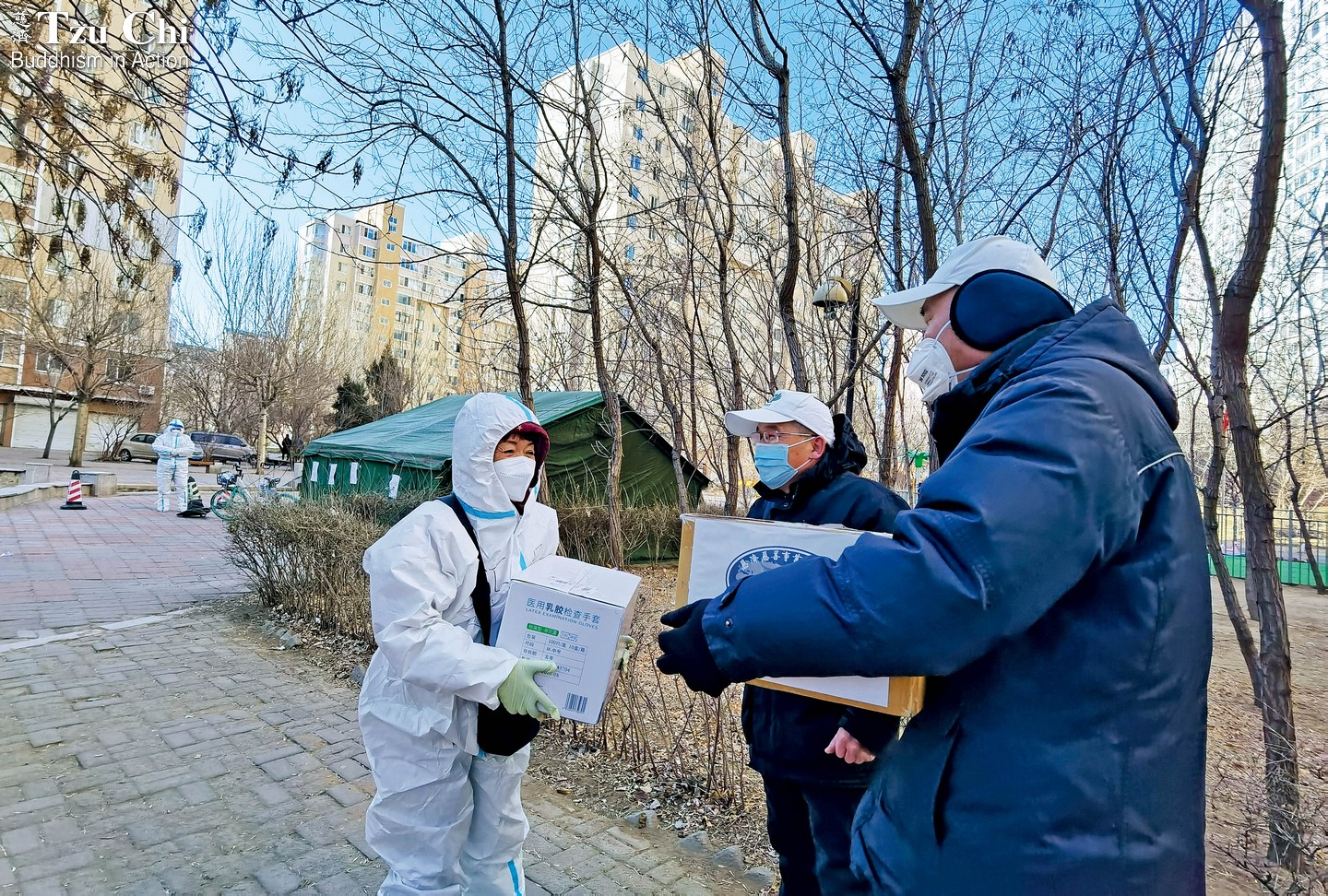
Tzu Chi volunteers donated medical masks and gloves to frontline workers to help safeguard their health after a COVID-19 test was mandated for all the residents of Shenyang on December 31, 2020. Liu Yiying
Challenges on the frontline
On January 11, a third round of COVID-19 testing was launched in the Tiexi, Huanggu, and Yuhong districts. The testing site in Qigong Subdistrict, Tiexi, was located at the Chinese Industry Museum. Medical professionals and community workers there began working 20-hour days in low temperatures.
Tzu Chi volunteers joined the effort at the testing site on January 13. Volunteer Cao Yong briefed everyone on what they would be doing, which included guiding people, registering people to be tested, and maintaining order. About 5,000 people to be tested arrived that day. Cao reminded his fellow volunteers to stay vigilant and not relax their protective measures. He said that even though it was a good thing to volunteer and serve others during this difficult time, it was just as important to stay safe. A community officer helped the volunteers put on protective clothing. He told them to write their names on their clothing first because it’d be nearly impossible to distinguish one person from the next once they were identically clad head to toe in the protective gear.
People stood in orderly lines waiting for their turn in the lobby at the testing site. They cautiously maintained a distance of one meter between themselves. Tzu Chi volunteers, after familiarizing themselves with the computerized procedures, carefully verified each testee’s identity to avoid any mistakes. Because the weather was so cold, condensation soon began to appear on the medical workers’ face shields. They appeared unaffected, however, and pressed on with their work.
For nearly six and a half hours, from 3:30 in the afternoon to ten, the testing center was besieged by an endless stream of people queuing to be tested. The outdoor temperature hovered around -20 degrees Celsius, dropping even lower at night. There was no central heating indoors, so it was freezing inside too. Volunteer Gao Xiuli (高秀麗), who was helping maintain order, said the sub-zero temperatures were making things very difficult. “Winter in northeast China is so freezing cold,” she said. “My hands and feet are icy. My feet are especially bad—they keep having cramps from the coldness.” Low temperatures weren’t the only problem she had to deal with. “I’ve been on my feet for over four hours now. My back hurts and my feet are stiff. My movements are confined by the protective clothing I’m wearing, and it’s difficult to breathe through my face mask. My face shield is so fogged up I have trouble seeing things.” She said that being a volunteer on this day had really made her realize the challenges frontline medical professionals face every day.
She added that healthcare workers have their own families and personal lives too, but when they don their protective clothing, they have to temporarily put everything else aside to focus on their mission to save lives. “I feel I have a responsibility and obligation to contribute my bit to society too,” she said.
Lu Minggang (呂明剛) was another Tzu Chi volunteer serving on-site. He noticed that the workers responsible for recording and collecting test samples at the testing location each had a space heater under their desks, but they still stamped their feet to keep warm. Such an observation drives home how low the temperature was and its impact on the workers.
Lu lives close to the community that had the imported case. He said he had queued for testing before too. At the time, he hadn’t felt much of anything for the people serving them and had complained about the long wait. But all that changed after he volunteered at this day’s event.
“When I first put on the protective clothing to work today, I felt pretty good,” he said. “I felt proud of myself, thinking, ‘It’s more of a blessing to serve others than to be served.’ But after about half an hour, those good feelings started to fade. My face shield had fogged up with my breath and the cold had started creeping up my back.” Like volunteer Gao, he helped maintain order at the event. When older people with limited mobility showed up, he sometimes had to step forward to give them a supporting hand. Misgivings were inevitable when such close contact couldn’t be avoided. Only then did he realize what frontline pandemic workers were going through. His respect and admiration for them rose.
“If I hadn’t practiced Buddhism under the guidance of Master Cheng Yen over the last several years,” he said, “I wouldn’t have had the courage to go among people during this critical time to give of myself, and I’d have missed out on this chance to cultivate wisdom and blessings for myself. I can now give joyfully because I know better.”
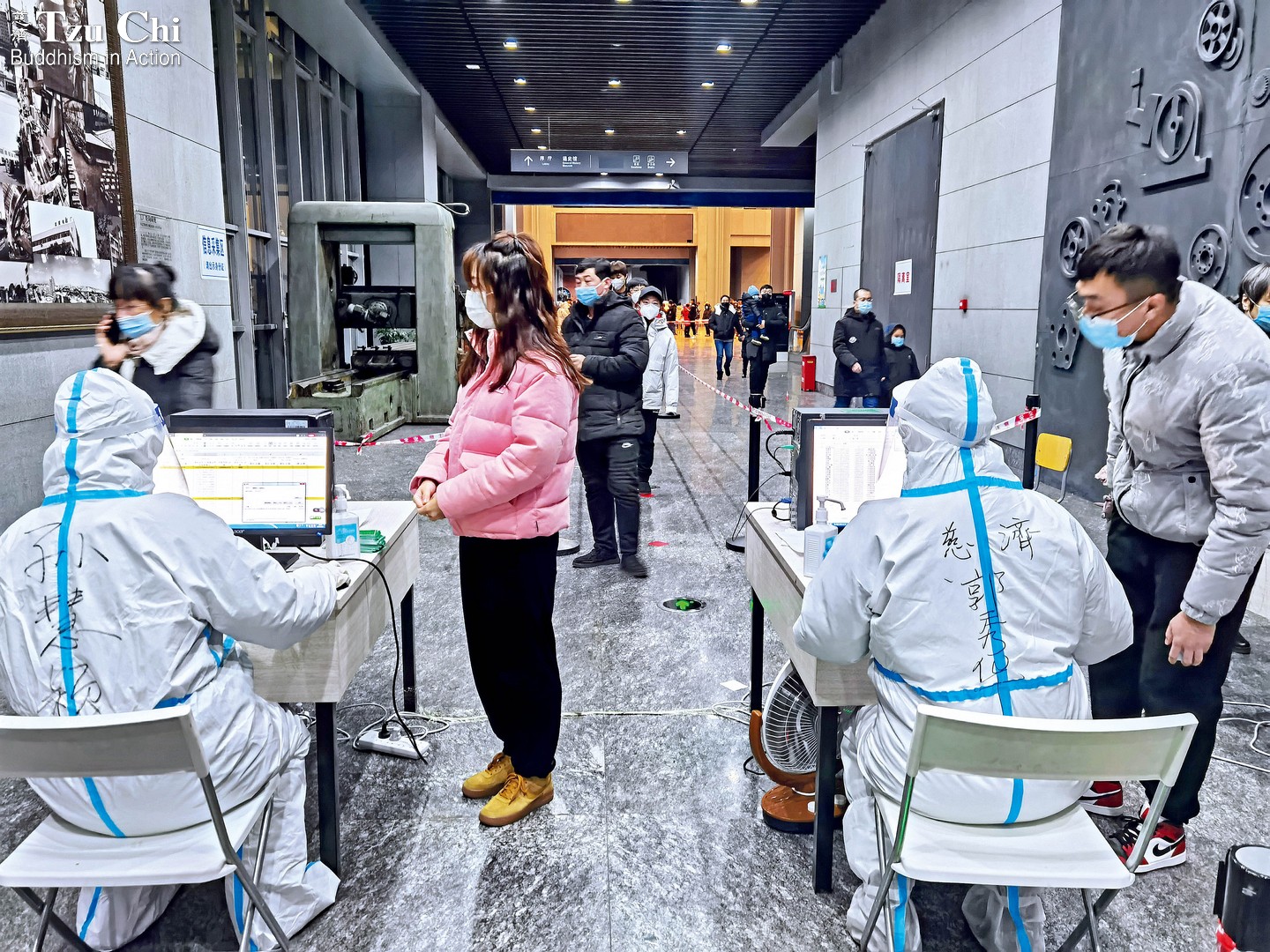
Tzu Chi volunteers serve at a COVID-19 testing site at the Chinese Industry Museum in Tiexie District, Shenyang. They verified people’s identities and explained the testing procedures to them. Li Lixin
Lighting up inner lights
From January 7 to 26, 2021, Tzu Chi volunteers in Shenyang worked 243 shifts extending care to 25 communities. Volunteer Sun Huiying, reflecting on this experience, said that when the coronavirus first started to spread in China in early 2020, she and other volunteers in the country sat trapped at home, feeling helpless and at a loss for what to do. It was only when Tzu Chi headquarters in Taiwan, overcoming many difficulties, arranged to have personal protective equipment sent to them from other countries that they were able to step out of their homes, properly protected, to help in the battle against the pandemic. Now, a year later, another wave of infections had emerged, but she and other volunteers already knew very well what they needed to do. Taking warmth and love to the places that needed them the most had become their shared commitment.
Sun summed up the force that drives them in a simple yet profound statement: “It’s our mission to take every opportunity to spread goodness, inspire love, and light up the inner light in everyone’s heart.”
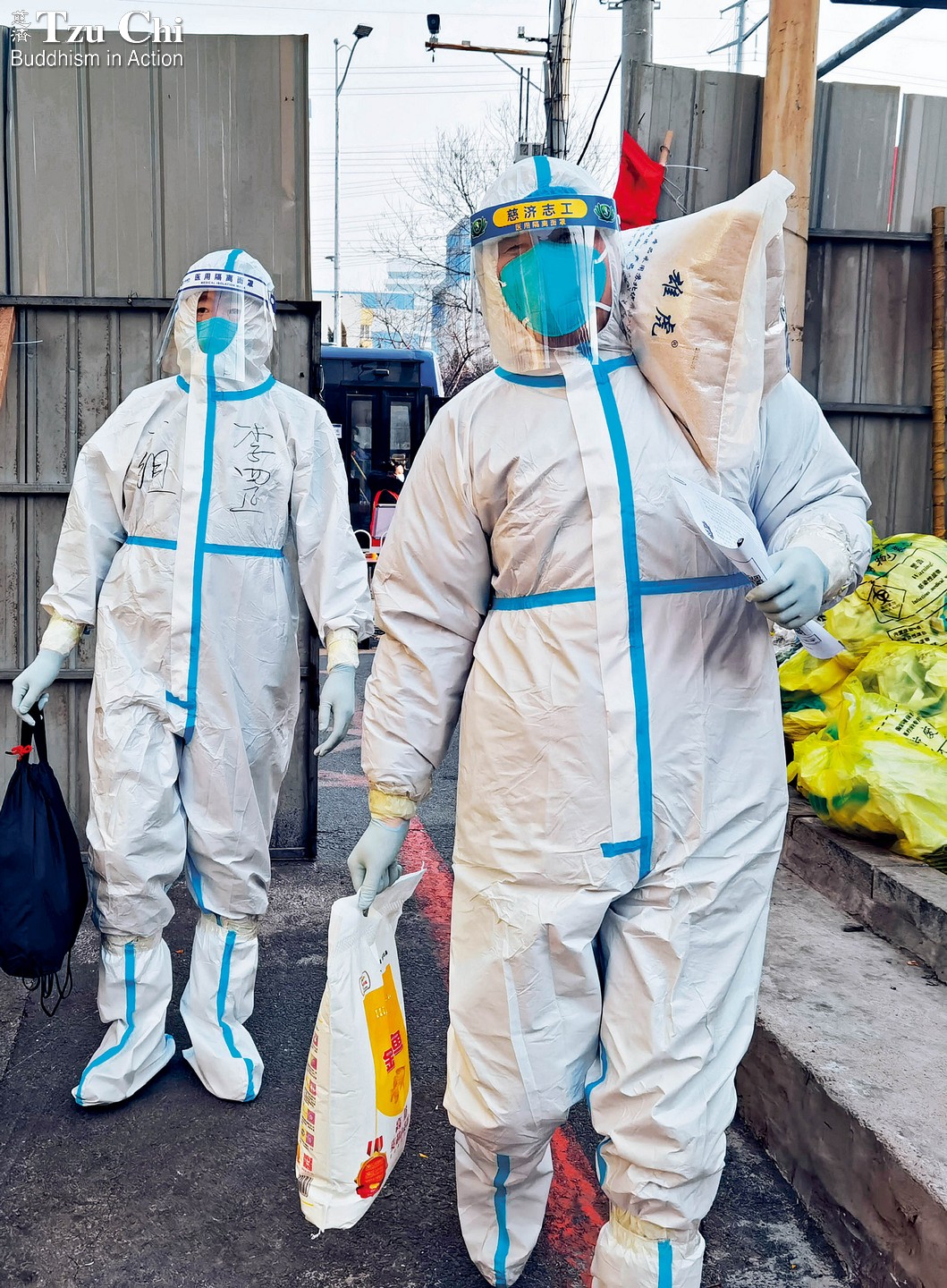
Volunteers, dressed in isolation suits, caps, and booties, deliver daily necessities to Tzu Chi care recipients in the lockdowned Huagong community in Tiexie District, Shenyang, on January 24. Li Lixin

